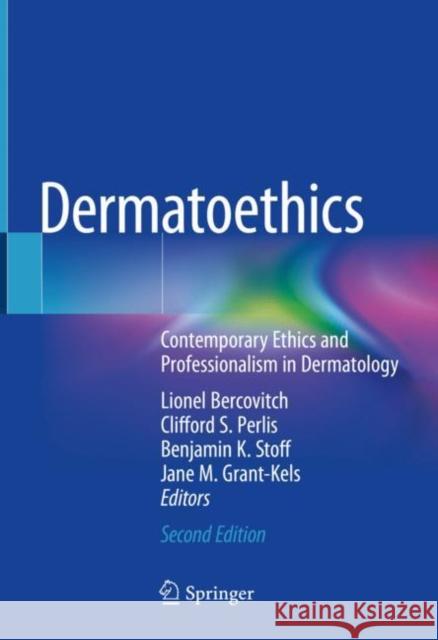Dermatoethics: Contemporary Ethics and Professionalism in Dermatology » książka



Dermatoethics: Contemporary Ethics and Professionalism in Dermatology
ISBN-13: 9783030568603 / Angielski / Twarda / 2021 / 458 str.
Dermatoethics: Contemporary Ethics and Professionalism in Dermatology
ISBN-13: 9783030568603 / Angielski / Twarda / 2021 / 458 str.
(netto: 345,02 VAT: 5%)
Najniższa cena z 30 dni: 346,96
ok. 16-18 dni roboczych.
Darmowa dostawa!
Foundations of Dermatoethics.- Dermatology at the beginning and end of life.- Beyond the office visit: ethical obligations outside of the traditional dermatologist patient encounter.- Nontraditional interventions and drug dispensing.- Communication and the dermatologist-patient relationship.- Professional boundaries.- Dealing with difference.- Self-care and self –improvement.- Public health and advocacy.- Corporatization, consolidation, and conflict of interest in dermatology.- Honesty in advertising in dermatology.- Is there a moral obligation for dermatologists to accept health insurance?.- Distributive justice and drug dispensing and pricing.- Responsibilities of the trainee to the patient; disclosure, supervision, first-time procedures.- Faculty-resident-student and mentor-mentee relationships; healthy and unhealthy dynamics.- Ethics of residency and fellowship matches.- Ethical responsibilities of program directors.- Ethical responsibilities of department chairs.- Role of medical students in clinic.- Publication ethics.- Ethics of clinical trial design.- Respect for human subjects: Ethical obligations of investigators.- Clinical practice guidelines and conflicts of interest.- Role of industry in research funding; non-disclosure agreements.- Ethics for research consortiums.- Ethics of cutting edge trials for desperate patients.
Lionel G. Bercovitch, MD specializes and is board certified in pediatric dermatology. Dr. Bercovitch attended medical school at the University of Manitoba Rady College of Medicine in Winnipeg,Canada and completed his dermatology residency at Brown University Affiliated Hospitals. He is director of pediatric dermatology at Hasbro Children's Hospital and Brown Dermatology and Professor of Dermatology at The Warren Alpert Medical School of Brown University. He is Co-Editor-in-Chief of Pediatric Dermatology,
Dr. Clifford Perlis, MD, MBioethics studied human biology and ethics in society as an undergraduate at Stanford University. He then completed medical school at the University of Pennsylvania where he also obtained a masters degree in bioethics. He was elected to the national medical honor society, Alpha Omega Alpha, while at the University of Pennsylvania. He completed Dermatology Residency and a Fellowship in Mohs Surgery and Cutaneous Oncology at Brown University. He is board certified by the American Board of Dermatology and a member of the American College of Mohs Surgeons. For his first nine years in Philadelphia, Dr. Perlis directed the Mohs surgery program at Fox Chase Cancer Center. He also served as chairman of the Fox Chase Cancer Center IRB. He maintains an appointment as an Adjunct Associate Clinical Professor at the Lewis Katz School of Medicine at Temple University.
Benjamin Stoff, MD, MAB is Associate Professor of Dermatology at Emory University School of Medicine. He practices general dermatology and dermatopathology at Emory and teledermatology consultation through the Atlanta VA Medical Center. In 2016, Dr. Stoff earned a Master of Arts in Bioethics from the Emory Center for Ethics, where he currently holds an appointment as Senior Faculty Fellow. He is deputy chair of the Professionalism and Ethics committee of the American Academy of Dermatology and chair of the Ethics Committee of the American Society of Dermatopathology. He is also co-director of the ethics track for residents and fellows through the Emory Office of Graduate Medical Education.
Jane M. Grant-Kels, MD, FAAD, is presently Vice Chair of the Department of Dermatology, Associate Director of the UCONN Dermatology Residency, Founding Director of the Cutaneous Oncology Center and Melanoma Programs and Professor of Dermatology, Pathology and Pediatrics at the University of Connecticut Health Center as well as Adjunct Professor of Dermatology at the University of Florida in Gainesville, FL. She is also founding chair emeritus of the Department of Dermatology, founding director emeritus of the UCONN dermatology residency program, and founding director emeritus of the UCONN dermatopathology laboratory. She attended Smith College and Cornell University Medical College and then trained in pediatrics and dermatology at Cornell’s New York Hospital. Following her residency, she completed a dermatopathology fellowship at New York University with A Bernard Ackerman. She serves on numerous editorial boards related to her field and was the founding editor in chief of the Journal of Clinical Medicine and the founding co-editor in chief of the International Journal of Women’s Dermatology. Presently she is Deputy Editor of the Journal of the American Academy of Dermatology. She has been a member of the following boards: Board of the Women’s Dermatologic Society, Board of the Association of Professors of Dermatology and Board of the American Academy of Dermatology. She was Vice President of the AAD 3/2019-3/2020. She has also been the recipient of the WDS Rose Hirschler Award in 2018, the AAD Professionalism Award in 2014, as well as AAD Presidential Citations in 2016 and 2017. Her areas of interest are pigmented lesions, reflectance confocal microscopy, dermoscopy and dermatoethics. Finally, she teaches dermatoethics, dermoscopy and confocal microscopy to the residents at the University of CT and University of FL. She has published over 360 manuscripts, 147 chapters, guest edited 22 journals, and edited or co-authored 8 books and delivered over 700 invited lectures. She has been married for over 46 years, has two children and five grandchildren
This extensively updated textbook reviews the ethical issues faced within dermatology. Bringing together practical real-life case scenarios and scholarly analysis, it covers the foundations of bioethics, as well as ethical issues associated with the various roles dermatologists play, including clinician, professional, educator, business person, and scholar. New chapters on the ethics of dermatologic care during pandemics, non-traditional interventions, private equity in dermatology, self-care and improvement, skin cancer screening, maintenance of certification, the ethics of clinical trial design are also included.
Dermatoethics: Contemporary Ethics and Professionalism in Dermatology, 2nd Edition creates a dialogue around issues of ethics and professionalism within dermatology and is an essential text for both trainee and practicing dermatologists wishing to immerse themselves in the key questions in the discipline.
1997-2026 DolnySlask.com Agencja Internetowa
KrainaKsiazek.PL - Księgarnia Internetowa









